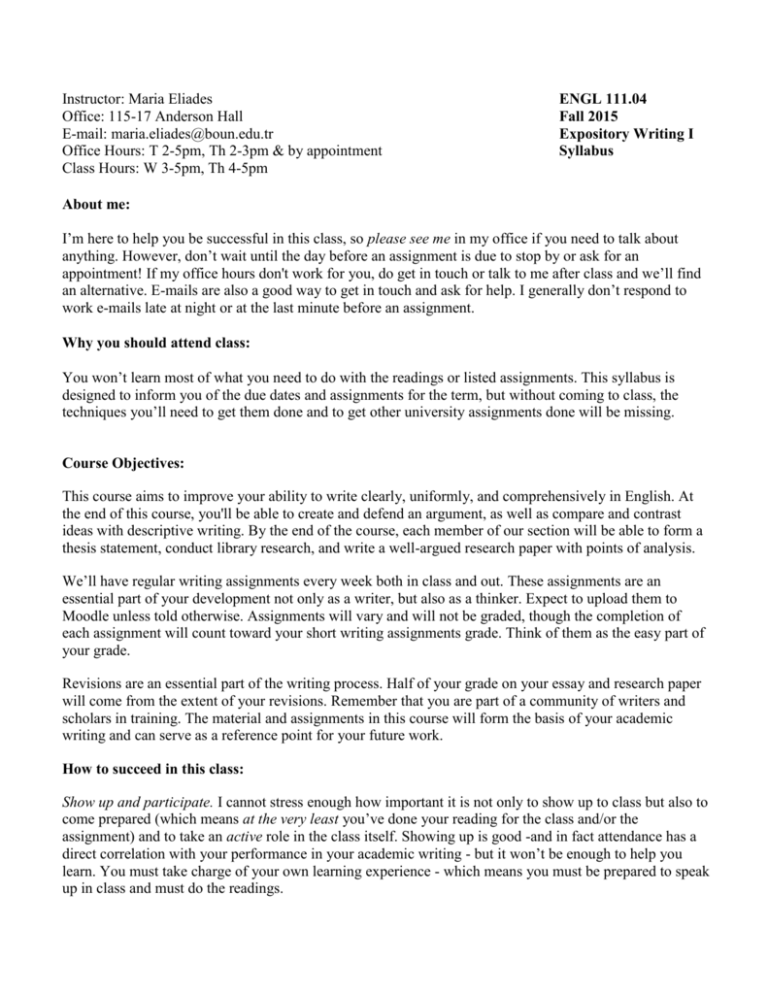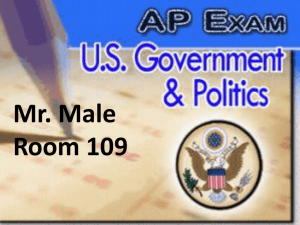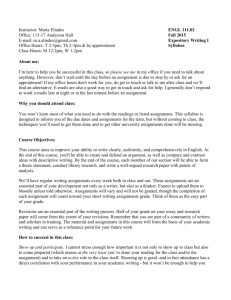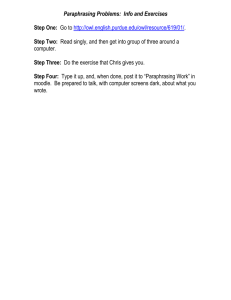ENGL 111.04 Fall 2014 Syllabus
advertisement

Instructor: Maria Eliades Office: 115-17 Anderson Hall E-mail: maria.eliades@boun.edu.tr Office Hours: T 2-5pm, Th 2-3pm & by appointment Class Hours: W 3-5pm, Th 4-5pm ENGL 111.04 Fall 2015 Expository Writing I Syllabus About me: I’m here to help you be successful in this class, so please see me in my office if you need to talk about anything. However, don’t wait until the day before an assignment is due to stop by or ask for an appointment! If my office hours don't work for you, do get in touch or talk to me after class and we’ll find an alternative. E-mails are also a good way to get in touch and ask for help. I generally don’t respond to work e-mails late at night or at the last minute before an assignment. Why you should attend class: You won’t learn most of what you need to do with the readings or listed assignments. This syllabus is designed to inform you of the due dates and assignments for the term, but without coming to class, the techniques you’ll need to get them done and to get other university assignments done will be missing. Course Objectives: This course aims to improve your ability to write clearly, uniformly, and comprehensively in English. At the end of this course, you'll be able to create and defend an argument, as well as compare and contrast ideas with descriptive writing. By the end of the course, each member of our section will be able to form a thesis statement, conduct library research, and write a well-argued research paper with points of analysis. We’ll have regular writing assignments every week both in class and out. These assignments are an essential part of your development not only as a writer, but also as a thinker. Expect to upload them to Moodle unless told otherwise. Assignments will vary and will not be graded, though the completion of each assignment will count toward your short writing assignments grade. Think of them as the easy part of your grade. Revisions are an essential part of the writing process. Half of your grade on your essay and research paper will come from the extent of your revisions. Remember that you are part of a community of writers and scholars in training. The material and assignments in this course will form the basis of your academic writing and can serve as a reference point for your future work. How to succeed in this class: Show up and participate. I cannot stress enough how important it is not only to show up to class but also to come prepared (which means at the very least you’ve done your reading for the class and/or the assignment) and to take an active role in the class itself. Showing up is good -and in fact attendance has a direct correlation with your performance in your academic writing - but it won’t be enough to help you learn. You must take charge of your own learning experience - which means you must be prepared to speak up in class and must do the readings. Note: You must attend 75% of all classes to turn in your Research Paper, which counts as a final exam. This is a department policy. Turn in assignments in their proper format and on time. Format is a stupid area to lose points on. Look at the sample papers and follow their notation style, font, and layout. When I say the font is to be 12-pt Times New Roman and double-spaced with 1” margins, that does not mean that 16-pt Arial single-spaced is okay, nor does it mean that extra spaces between paragraphs are okay. I’ve been a commercial editor for years. I’ll spot any of these infractions right away, and yes, I will deduct points if you do that. If you are having problems with resetting spell check to American English for your assignments, please seek out one of your classmates or one of our campus IT staff to fix it. Not following formatting and spelling conventions looks sloppy and unprofessional. For every day after a due date, I’ll subtract 10 points from your original grade. Losing points due to turning things in late is another stupid way to kill your grade. Be responsible by making sure that all parts of an assignment are present. If I say that I want you to hand in the first draft with the final draft, I mean it. I don’t haul around more paper for my own exercise. Both the first draft and final draft must be handed in on the final due date so that I’ll be able to compare your progress from your first draft and to give you better feedback. Do your reading. Occasionally I will “pop” a quiz on you to make sure you’ve been doing your reading and that you’ve been staying on top of your work. I’ll mainly ask about central ideas and content to check that you’ve prepared for class. Revise. I cannot stress this enough. Turn in a final draft which looks almost exactly like your previous draft with the exception of a few cosmetic changes (such as changing the format or changing a few sentences) and I will give you a grade at least a whole letter below the quality of the writing, organization, and research. A first draft is never perfect. Every researcher and writer needs to make significant changes between their first and final draft to create a strong and worthwhile paper. Create original work. Plagiarizing is a serious offense. Writing down some else’s ideas or work without giving them credit is stealing. At Boğaziçi, we take plagiarism seriously. A plagiarized paper will get you an F on that paper and will quite probably be reported to the university disciplinary committee. For more information on plagiarism, see the “About Plagiarism” entry by BU’s Department of Western Languages and Literatures (http://bit.ly/1oiOOam), as posted by BU’s Department of Philosophy. In this class, you will be required to submit your paper to Turnitin to help you learn how not to accidentally plagiarize. Required texts: -Course Reader, available at Hısar Fotokopi Recommended Resources: -On researching and writing about history -on reserve at the library: Brundage, Anthony. Going to the Sources: A Guide To Historical Research and Writing. Wheeling, IL: Harlan Davidson, 2008. Burke, Peter. Eyewitnessing: The Uses of Images as Historical Evidence. Ithaca, NY: Cornell, 2001. Cullen, Jım. Essaying the Past: How to Read, Write, and Think about History. Great Britain: WileyBlackwell, 2009. McDowell, W. H. Historical Research: A Guide. Great Britain: Pearson, 2002. -Dictionaries: Merriam-Webster's College Dictionary Compact Oxford English Dictionary -Thesauri: Roget's Thesaurus Oxford Learner's Thesaurus -Online: Purdue's Chicago Manual of Style 16th Edition format guide (https://owl.english.purdue.edu/owl/resource/717/01) (for academic formatting) Grading: Short writing assignments 40% Research Paper 40% (20% revisions) Participation 20% Schedule: 28 September – 2 October Week 1 Day 1 – 30 September Introduction Day 2 – 1 October Syllabus Quiz The writing process: On brainstorming, planning, thinking critically, drafting, and revising Read: -Strunk. William, Jr. and E. B. White. "Elementary Principles of Composition." In The Elements of Style, 15-33, New York: Longman, 1999. 5 – 9 October Week 2 Day 1 – 6 October The writing process II Day 2 – 8 October Intro to analyzing for history Short assignment due 9 October by 5 pm 12 – 16 October Week 3 Day 1 – 14 October Screening of “How Schools Kill Creativity” In class reflection paper (turn in at end of class) Brainstorm due in class Day 2 – 16 October The Research Process 19 – 23 October Week 4 Day 1 – 21 October Library visit Day 2 – 22 October Arguments and analysis: How to make an argument Discussion of reading Read: -Pinker, Steven. "Mind Over Mass Media." In 40 Model Essays: A Portable Anthology, edited by Jane E. Aaron and Ellen Kuhl Repetto, 293-295, Boston: Bedford/St. Martin's, 2013. Thesis statement due in class Short assignment due 23 October by 5 pm 26 – 30 October Week 5 Day 1 – 26 October No class Day 2 – 29 October Republic Day -No class 2 – 6 November Week 6 Day 1 – 4 November On note-taking + on film analysis Analyzing for history continued Read: -Mazower, Mark. "Conquest, 1430." In Salonica, City of Ghosts: Christians, Muslims and Jews 1430-1950, 15-30, London: Harper, 2005. Formal Reflection on "Mind Over Mass Media" due by 5 pm Day 2 – 5 November In class screening, Film TBA 9 – 13 November Week 7 Day 1 – 11 November In class screening continued In class writing of formal reflection Day 2 – 12 November On academic style Formal reflection on film due by 5 pm 16 – 20 November Week 8 Day 1 – 18 November Writing the first draft of anything -but especially the essay Discussion of sample papers Outline of Paper Due in class Read: Sample papers (in Course Reader) Day 2 – 19 November Library day Two additional sources due by end of class 23 – 27 November Week 9 Day 1 – 25 November Plagiarism Day 2 – 26 November On Chicago Style + Drafting the research paper Study: -“The Purdue OWL: Citation Chart.” Purdue OWL, Last Modified October 2014. http://owl.english.purdue.edu/media/pdf/20110928111055_949.pdf. Short assignment due 26 November by 5 pm 30 November – 4 December Week 10 Day 1 – 2 December Drafting the research paper (2) practicum Bring in papers and your notes as they are for trouble-shooting Day 2 – 3 December On revising and giving good feedback Peer Review Research Paper Due (First Draft) in class, and to Turnitin and Moodle by 5 pm1 7 – 11 December Week 11 Day 1 – 9 December Discussion of “Alexandria: British Years” Read: -Mansel, Philip. "Alexandria: British Years." In Levant: Splendour and Catastrophe on the Mediterranean, 127-147, London: Murray, 2011. Day 2 – 10 December On citations Bring in research papers for in-class activity Short assignment due 11 December by 5 pm 14 – 18 December Week 12 Day 1 – 16 December Writing tune-up Discussion of “Introduction” Read: -Mazower, Mark. "Introduction." In Salonica, City of Ghosts: Christians, Muslims and Jews 1430-1950, 112. London: Harper, 2005. Day 2 – 17 December Peer Review Research Papers (Second Draft) due in class, and to Turnitin and Moodle by 5 pm 21 – 25 December Week 13 Day 1 – 23 December “Damsel in Distress” short video screening and in-class writing activity Day 2 – 24 December TBA December 25 Research Papers (Final Draft) due to Turnitin and Moodle by 5 pm 1 Note that the grade to be given on this assignment is theoretical and not actual. Therefore, take what you see as the indication of what you would get if this was the final draft, so as to help you know how much you need to work on it.






